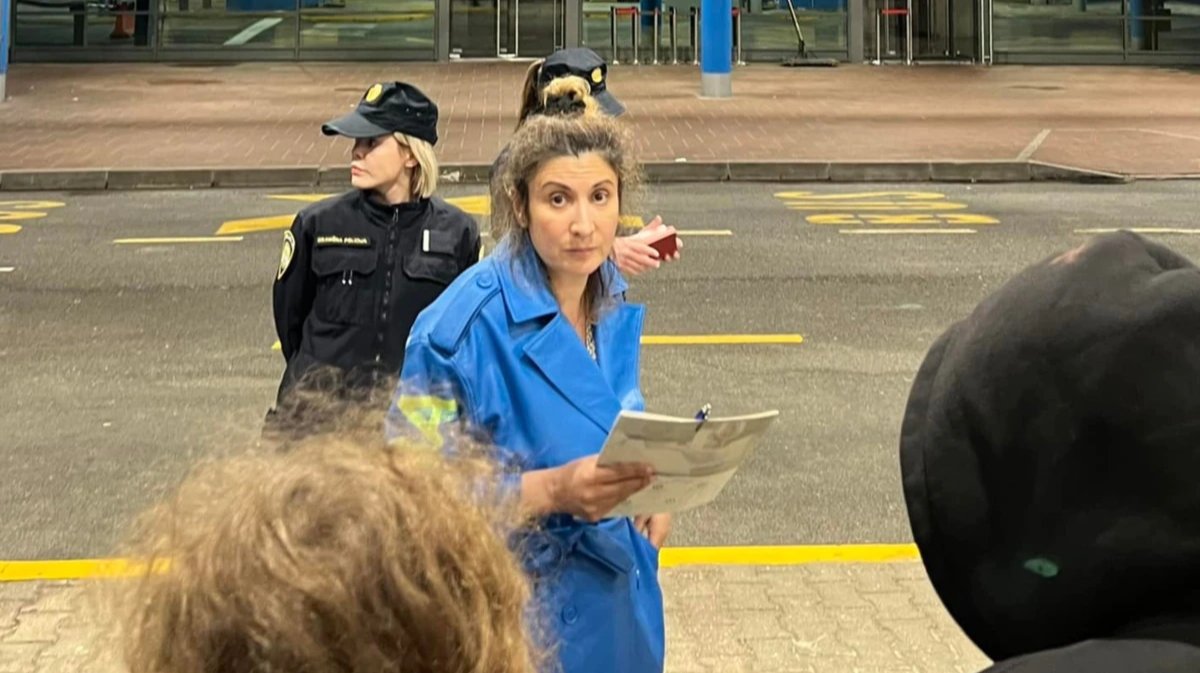Aysoltan Niyazova, former executive director of a Russian bank and currently a member of Pussy Riot, was detained in Croatia in early June. Her arrest was reportedly on the basis of an INTERPOL warrant issued at the request of Turkmenistan twenty years ago. Ashgabat accuses Niyazova of embezzlement to the tune of $41 mln from the country’s Central Bank. Aysoltan had already served a six-year sentence in a Russian jail on the same charges, although if the offence did take place, it likely was committed by someone else. In fact, the whole thing seems more like an attempt by the Turkmenistan regime to take down the opposition. Novaya Gazeta. Europe talks about the life of Aysoltan Niyazova, a political prisoner, a punk activist and a victim of the slow churn of European bureaucracy.
Türkmenbaşy’s reign of terror
Aysoltan Niyazova, or simply Aya, as her friends call her, was born and raised in Ashgabat, Turkmenistan. She witnessed the fall of the Soviet Union and the unopposed election of Saparmurat Niyazov as president of the independent Turkmenistan. Niyazov happens to have the same surname as Aysoltan. The 15-year rule of Niyazov is marked by a cult of personality around the president, a violent crackdown on the opposition and a series of political assassinations. Niyazov’s desire to stay in power was so strong that only two years after he was appointed president by the decision of the local parliament, he awarded himself the title of Türkmenbaşy, meaning Head of the Turkmen. Our protagonist’s family was among the victims of the Turkmenistan repression machine.
After the fall of the Soviet Union, residents of the newly independent countries, including Turkmenistan, started to hope for a new world order and the establishment of a democracy-like system of government. The first public organisations and NGOs, as well as "democratic unions" of all kinds, started to appear in Turkmenistan. However, the government quickly suppressed any attempts of the opposition to unite themselves. In 1992, Avdy Kuliev, the first Foreign Minister of Turkmenistan, publicly spoke out against Niyazov and left the country, which triggered the first wave of emigration.
Several years later, the next Foreign Minister of Turkmenistan Boris Shikhmuradov, also spoke out against the president. In December 2001, he left for Moscow, handed in his diplomatic passport and held a press conference, during which he publicly condemned Niyazov’s regime and announced his intent to support the opposition. Shikhmuradov was seen as the Alexey Navalny of his time, Aysoltan recalls.
On 25 November 2002, an assassination attempt on Niyazov was reported in the media. According to the official version of events, a KAMAZ truck separated the president’s vehicle from his convoy, while armed people rushed out of the neighbouring buildings shooting at Niyazov’s car. As a result, several people within Türkmenbaşy’s entourage were injured, while the president himself supposedly did not even notice the attack. On the next day, the Turkmen special services arrested 16 people suspected of involvement in the assassination attempt at once.
"My father was in Turkmenistan at the moment of the assassination attempt, we kept in touch. I don’t know if there was an assassination attempt or not. But the opposition’s goal was to get [Niyazov] to stand trial. Besides, people who allegedly ran around with automatic rifles shooting at the president were detained at their homes on the same day. So, these people came home, hid their guns and military uniform, put the kettle on, and then the police arrived and said ‘You bastards, you wanted to kill our president.’ This is how it happened according to the prosecutor general" Editor-in-Chief of Gündogar news outlet Boris Shikhmuradov Jr. (the son of Boris Shikhmuradov) recalls.
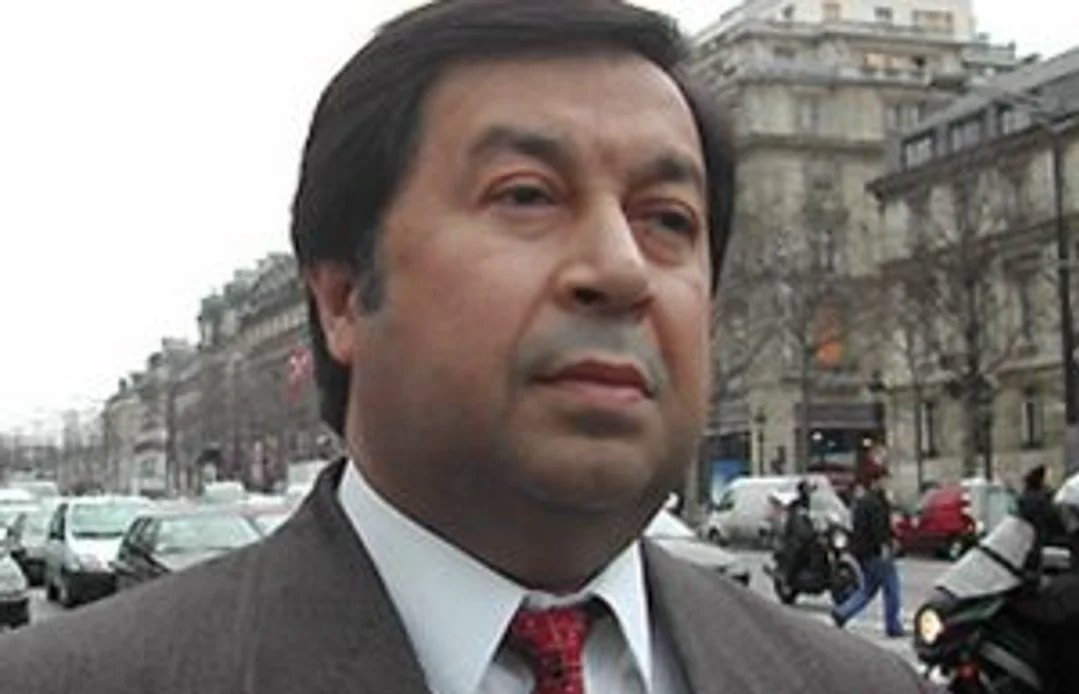
Boris Shikhmuradov. Photo: Wikimedia Commons
Niyazov accused prominent opposition figures at the time of involvement in the assassination attempt, including Boris Shikhmuradov, former Minister of Agriculture Imamberdy Yklymov, former head of the Central Bank Khudayberdy Orazov and former Ambassador of Turkmenistan to Turkey Nurmukhammed Hanamov.
Over 300 people were detained in relation to the "assassination attempt on Türkmenbaşy", the fate of most of them is still unknown. Boris Shikhmuradov was detained in Ashgabat in late 2002. Since then, his son has heard nothing from his father.
Aysoltan’s father, Kurbanmurad Niyazov, was detained around the same time. Her father, previously a prosecutor, started working as an attorney and became involved in human rights efforts in the country in the late 90s. Nothing is known about him since his arrest. There is practically no information available on Niyazov online. He is mentioned once by Gündogar: "Kurbanmurad Niyazov and Hayit Kakaev [Deputy Head of the National Security Committee of Turkmenistan] died while in custody at a detention centre, clearly due to malnourishment and lack of medical aid." Despite the fact that Kurbanmurad Niyazov is a common name in Turkmenistan, Shikhmuradov Jr. is confident that the man described in the message is Aysoltan’s father.
Aysoltan herself did not witness what was happening in Turkmenistan under Niyazov’s rule, as she moved to Russia’s Vladivostok in 1995. Her decision was not politically motivated at the time. For personal reasons, she wanted to get away from her past, and she left for Russia’s Far East with her eight-week-old son.
"With my Soviet Union passport, I moved from Ashgabat to Vladivostok. I never received citizenship of Turkmenistan. First, I was a citizen of a USSR republic that had ceased to exist at the time, and then I became a citizen of the Russian Federation", Aysoltan notes (this will be important later).
Aysoltan found out what was happening in Turkmenistan from her friends and relatives. Her mother, an ethnic Russian, worked as an attorney. By the late 90s, she was unable to represent her clients in court, as all judicial proceedings had to take place only in the Turkmen language. "My mother called me in tears and told me that there was complete mayhem. Her friends and acquaintances were being arrested right in front of her, without charge or trial", the woman remembers.
Türkmenbaşy’s repression machine kept churning. It would reach our protagonist a little later.
‘The theft of the century’
After moving to Vladivostok, Aysoltan started working at a local bank. 18 months later, she managed to get a loan from the bank and help her mother and other relatives move to Vladivostok. She later moved to Moscow. In 1997, Aysoltan was hired as deputy chairwoman of the Federal Deposit Bank, and later got the license to open her own bank, called Index Bank, where Aysoltan served as board chairwoman.
Aysoltan had a pretty good life in Moscow: she had a well-paid job that allowed her to provide for her son. She also found friends among the Turkmen immigrant community.
"Part of the opposition moved to Moscow back in the 90s, we used to meet there. I was young, I wasn’t really into politics,
I was more interested in the development of the banking system, I wanted to earn money. Sometimes, I donated money [to the opposition] when they needed my help. A thousand dollars, five thousand dollars, but it was always my own money", she said.
Several years later, Aysoltan got a call from her friends in Turkmenistan who urged her to leave Russia as soon as possible. In 2002, Turkmenistan initiated criminal proceedings over embezzlement of funds from the country’s Central Bank. Aysoltan was one of the suspects in the case.
"The theft of the century", "millions stolen from Türkmenbaşy," the media wrote at the time. According to the official version of events, Turkmen special services discovered the disappearance of $41 mln from Turkmenistan’s Central Bank account. According to the prosecution, half of this sum was transferred and laundered through Russian banks, including Index Bank, whose board Aysoltan led.
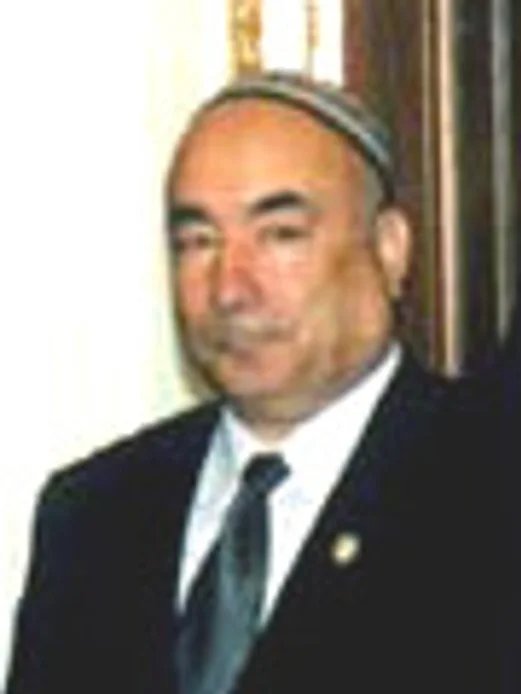
Seyitbay Gandymov. Photo: Wikimedia Commons
And then, heads started to roll. Chairman of Turkmenistan’s Central Bank Seyitbay Gandymov was the first victim: he was arrested right during a government session. He later died in prison. He was not officially accused of embezzlement; his arrest was simply a "punishment" for what had happened at the Central Bank. "Turkmenistan has an official term for this: failure to oversee the activity of an institution under a person’s control, unsatisfactory work," Boris Shikhmuradov Jr. explains.
Ashgabat has persecuted Turkmen and Russian officials and bank workers over "the theft of the century" for many years. The Russian law enforcement came to the aid of their Turkmen colleagues, charging several people suspected of money laundering in relation to the Turkmen case.
The protagonists
Aysoltan heeded her friends’ advice and moved to Switzerland with her son soon after that phone call. Meanwhile, a wave of arrests started in Russia: police were detaining people who might have been involved in the Turkmen embezzlement case.
A former accountant of Turkmenistan’s Central Bank Murad Garabaev was among the first suspects detained in Moscow in September 2002. At the time, Garabaev had double Russian-Turkmen citizenship. Representatives of Turkmen special services were present during his interrogation by the Russian police. Garabaev also said that his relatives from Turkmenistan had called him in the months preceding his arrest saying that they were being pressured. Soon after his arrest, Garabaev was informed that he was being extradited to Turkmenistan. He was later represented by attorney Anna Stavitskaya, known for her work in the case regarding the murder of Novaya Gazeta reporter Anna Politkovskaya.
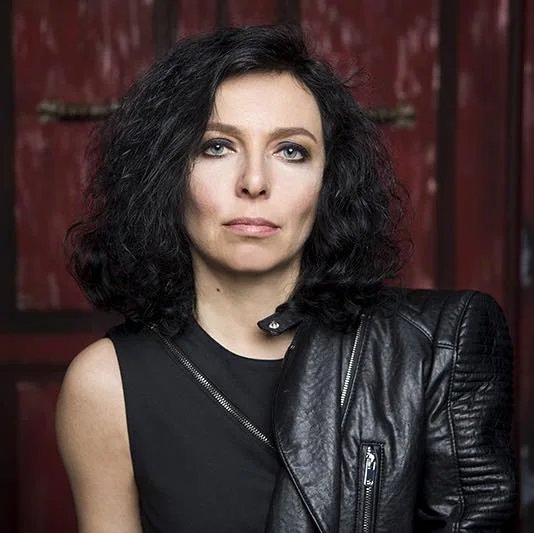
Anna Stavitskaya. Photo: Facebook
According to Stavitskaya, the extradition of Garabaev to Turkmenistan was completely unlawful. "He was a citizen of Russia, and Russia handed him over despite the fact that this is impossible according to Russian law. The Criminal Code forbids this, so does the Constitution, so do the international conventions ratified by Russia as of that moment", the attorney explains. Stavitskaya addressed the European Court of Human Rights (ECHR) with this issue. The ECHR granted her appeal. Russia followed the court’s ruling, and the former accountant was returned to Moscow.
"The fact that Russia opened a criminal case in relation to embezzlement of those funds served as a pretext for his return.
The thing is, according to the prosecution, only $40 mln were stolen from Turkmenistan’s Central Bank. Half of this money went through Russian banks; another half went through Latvian ones.
No one was looking into what happened in Latvia, it is still unknown. Russia, however, used this situation to get Garabaev back", Stavitskaya said.
Dmitry Leus, who at the time headed the Russian Deposit Bank, was also detained in Moscow in relation to the embezzlement case. According to the prosecution, half of the money stolen from Turkmenistan was transferred to the Russian Deposit Bank. Later, Leus supposedly subtracted a commission for the bank’s services and transferred the rest of money to Index Bank, headed by Aysoltan Niyazova.
In 2004, Leus and Garabaev stood trial in Russia. Moscow’s Zamoskvoretsky District Court acquitted both suspects on charges of embezzlement. However, Leus was still convicted of money laundering. The money that, according to the prosecution, was not stolen. It is impossible from a legal standpoint, Stavitskaya notes, yet it happened anyway. Leus was sentenced to four years in prison on money laundering charges. He got a suspended sentence and was released from prison two years later.
The investigation of the "theft of the century" was underway in Turkmenistan as well: employees of the Central Bank were accused of misappropriation of stolen funds. "That is, people in Turkmenistan were on trial for misappropriating the money, and in Russia, they were accused of stealing the money by deceiving the Central Bank. At the same time, no one specified who exactly had been deceived. It is impossible to deceive the Central Bank as an organisation. In order to find a person guilty of fraud, you need to prove who was the victim of the fraud, but the prosecution failed to do that. So, from a legal standpoint, this case is absolutely incomprehensible", Stavitskaya explained.
Aysoltan’s extradition
Despite the paradoxes and the contestable aspects within the case, the investigation continued, and several years later, Aysoltan was detained. Türkmenbaşy himself, Saparmurat Niyazov, died in 2006, but his case lived on. In 2011, Aysoltan was detained in Switzerland at the request of the Turkmen INTERPOL office (yes, there is an INTERPOL office in Turkmenistan), although she never was a Turkmen citizen. "They issued me a fake Turkmenistan passport, they found my old pictures on the Internet. I’ve never even seen it, I’ve never signed anything," she said. This document made Aysoltan’s arrest possible.
Switzerland refused to extradite Aysoltan to Turkmenistan based on the fact that the country did not sign the European Convention of Human Rights and that there are reports of torture and executions in Turkmenistan. Meanwhile, Russia got involved in the case and requested Aysoltan’s extradition to Moscow. It seems that Russia decided to help their dear colleagues.
Aysoltan’s extradition process lasted eight months. In the end, Russia’s request was granted. "When Switzerland was considering the matter of extradition, [Russian Foreign Minister] Sergey Lavrov and [Russian Prosecutor General] Yuri Chaika signed diplomatic guarantees that I would not be extradited to a third country. On this condition, Switzerland handed me over to Russia", Aysoltan said.
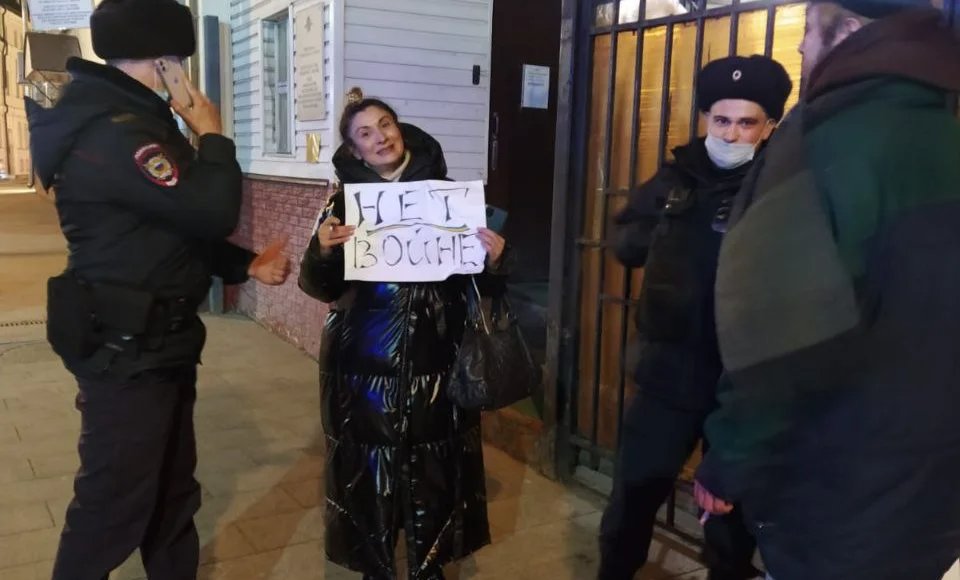
The inscription on the sheet: "no war". Photo from personal archive
Russian jail and Pussy Riot
Aysoltan was extradited to Russia in September 2011. In Moscow, she was transferred to a local pre-trial detention facility. The living conditions there were clearly different to a Swiss jail. "But at first, I didn’t even think of my living conditions. I left behind my 15-year-old son in Switzerland. My mental state was terrible. My son lost 20 pounds back then, he got so skinny. He told me he stopped believing in God and justice", she remembers.
After Aysoltan was admitted to the detention centre, she got a visit from representatives of the Swiss embassy. After witnessing the conditions of her detention, one of the embassy workers asked the ambassador’s permission to visit Aysoltan on a regular basis. Over the next several visits, Aysoltan told the Swiss official all about her life in prison and the shower situation.
Aysoltan spent nearly two and a half years at the pre-trial detention centre. Over this period, she was not allowed to call her son even once. "I had to ask my friends for help and bribe people to talk to my son. So, I had a phone in my cell. You’re stressed all the time anyway, and if they catch you with a phone, you’ll be sent to punitive confinement", she says.
In February 2012, two Pussy Riot members Maria Alyokhina and Nadezhda Tolokonnikova ended up in the same cell as Aysoltan after they were detained following their "punk prayer" inside Moscow’s Cathedral of Christ the Saviour. Human rights defenders and reporters often came to the detention centre to see Alyokhina and Tolokonnikova, while Aysoltan still received visits from Swiss embassy workers. The three women were isolated so that they would not teach other prisoners how to defend their rights. This is how Niyazova and Alyokhina ended up in the same separate cell and got to know each other.
The investigation of Aysoltan’s case concluded in May 2013. She was found guilty of embezzling $20 mln from the Central Bank of Turkmenistan and sentenced to six years behind bars. The sentence included the two and a half years spent at the pre-trial facility. Aysoltan was released on 31 December 2016.
Aya (short for Aysoltan) thinks that the "theft of the century" case was politically-motivated. "Niyazov simply needed to destroy the Turkmen opposition, and many, including myself, got hit with shrapnel", she said.
However, years after the trial and the time she served in prison, the "theft of the century" case came back to haunt Aysoltan once again.
An arrest that came twenty years late
While Aysoltan was serving her sentence, her apartment in central Moscow was seized by authorities, supposedly to pay out the damages to Turkmenistan. Once she was released from prison, Aya tried to open the door using her keys to find that the locks had been changed. Later, Aysoltan attempted to get her property back, however, she was told in no uncertain terms that she should think twice about that. "Do you miss prison? Then we’ll arrest you tomorrow for drug possession.’ This is how the negotiations went", Aya said.
Despite losing her apartment, Aya stayed in Moscow and found a job there. She kept in touch with the Pussy Riot girls. Her time in prison taught her to fight for her rights, and she started attending rallies in support of political prisoners, court hearings and protests. "The Swiss embassy even apologised to me, they attended all court hearings and they understood that I’m not a criminal", the woman says.
In the years following her release from prison, Aysoltan managed to get a passport with several European visas, including the Swiss laissez-passer. Last year, she flew to Switzerland to visit her son.
Shortly after the start of Russia’s invasion of Ukraine, Aysoltan flew to Switzerland once again, this time planning to request political asylum.
Maria Alyokhina, one of the members of Pussy Riot, escaped from Russia at about the same time. "Then Masha called me and invited me to come see her in Vilnius. Since then, I’ve been touring with Pussy Riot", Aya said.
Aya has visited Iceland, Germany, the Netherlands, Austria, Lithuania and Belgium during the Pussy Riot anti-war tour. The countries’ law enforcement did not find any issues with Aysoltan during her time there. However, the situation changed when the band arrived in Slovenia.
The women got to the hotel at about 3 a.m. Several hours later, while everyone was still asleep, Aya heard a knock at the door. It was the police. She was arrested over INTERPOL’s arrest warrant filed by Turkmenistan. Aya was taken to the police station, and in the morning, she was brought to a court in Ljubljana. This is how she says the court hearing went:
"The judge allowed me to use my phone to show all the documents regarding my case. At the same time, I called the Swedish ambassador asking him to send me the photos of the documents. The judge looked at them, read the statements by a Russian court, which said: ‘at an uncertain time, in an uncertain place, she entered into a criminal conspiracy with the aim to embezzle the funds of the Central Bank of Turkmenistan.’
"And this is what you suffered six years in prison for?" the judge asked me. Aysoltan was released after the court had read those documents.
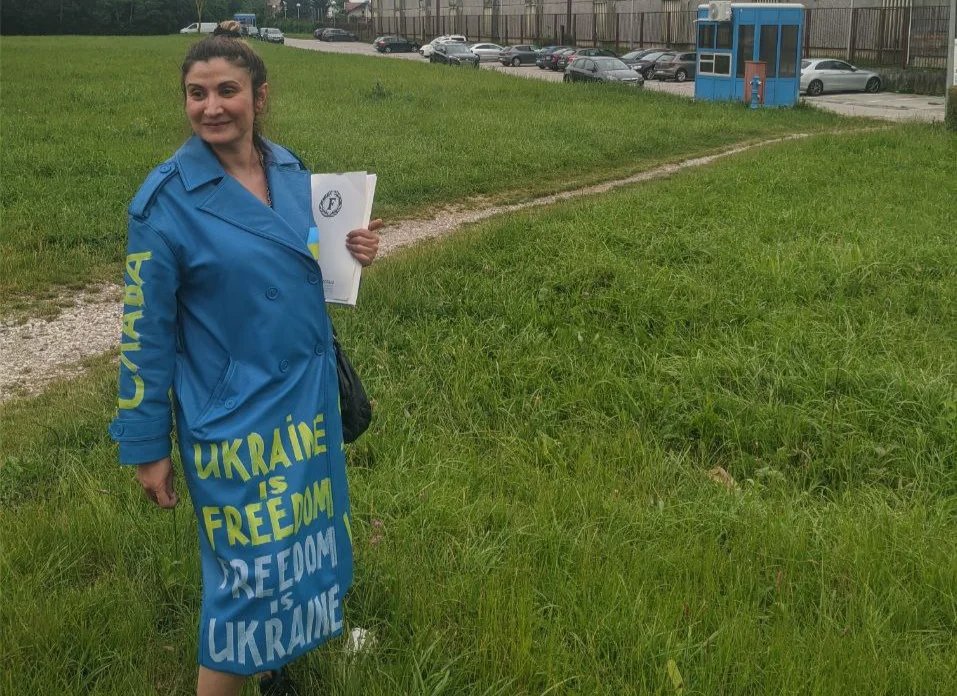
Near the prison in Zagreb. Photo from personal archive
Aya continued to tour Europe with Pussy Riot. And then, the same thing happened in Croatia. This time, the police detained Aysoltan on the border. After the woman was searched, she was taken to a police station where they took her fingerprints. Aya managed to get an attorney, and the Pussy Riot girls helped spread the information about her arrest online. Two days and several visits by human rights defenders later, Aysoltan was released once again.
Back in Slovenia, local officials told Aysoltan that the local INTERPOL database was not updated in time, and this is why she was detained. The same thing seems to have happened in Croatia. The ghost of Turkmenistan’s regime continues to haunt the woman over twenty years later. And the idea of going back to her homeland seems as far-fetched as ever.
